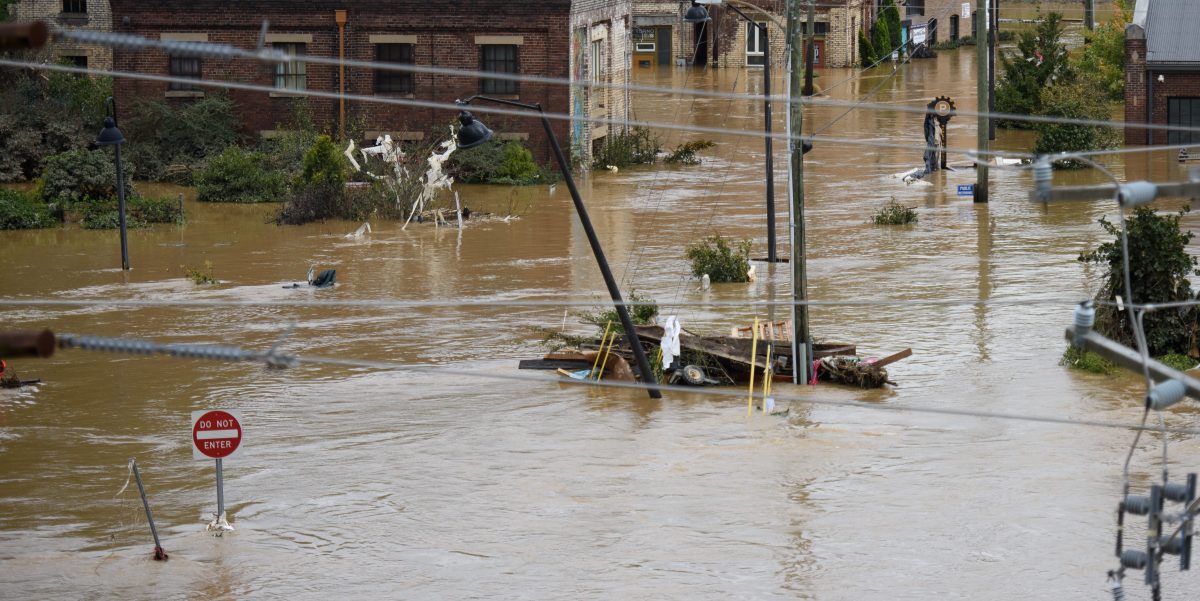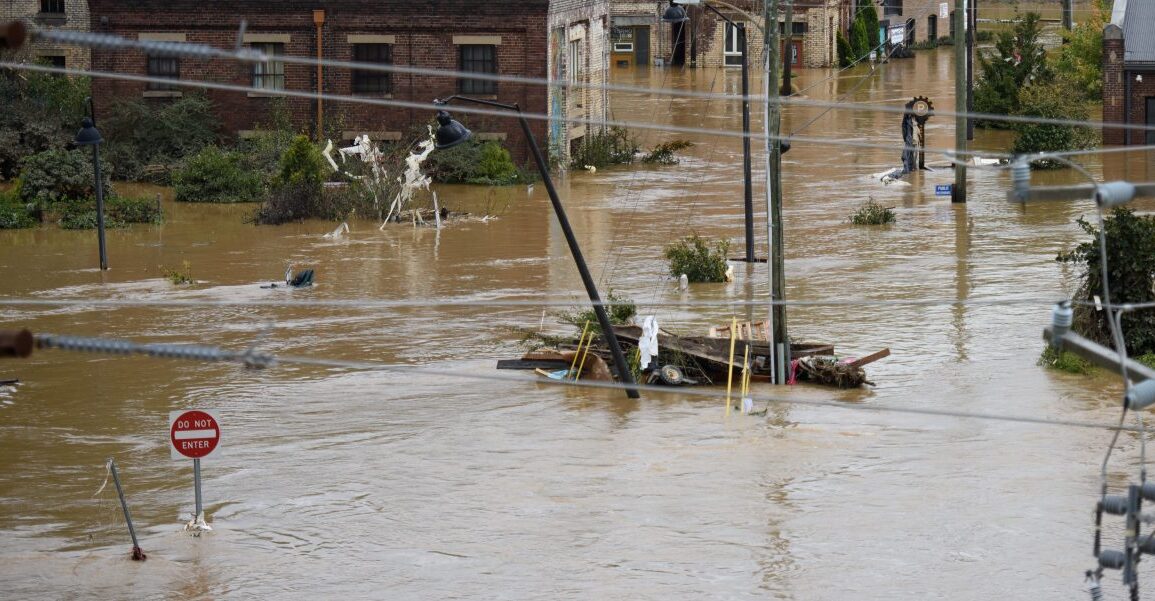
In the early morning hours last Friday, Nick climbed out of his bunk at Mountain View Correctional Institution in Spruce Pine, North Carolina, and stepped into a pool of water.
As Hurricane Helene unleashed a torrential downpour over Western North Carolina, Nick, whose story was relayed by a relative and who requested to go by his first name for fear of retribution, realized his single-occupancy cell in the state prison had begun to flood. Then he realized that his toilet no longer flushed.
“My husband told me this morning he’s going to have to go see a therapist because of the things that happened in there.”
For the next five days, more than 550 men incarcerated at Mountain View suffered in cells without lights or running water, according to conversations with the family members of four men serving sentences at the facility, as well as one currently incarcerated man. Until they were transferred to different facilities, the prisoners lost all contact with the outside world.
As nearby residents sought refuge from the storm, the men were stuck in prison — by definition, without the freedom to leave — in close quarters with their own excrement for nearly a week from September 27 until October 2.
“My husband told me this morning he’s going to have to go see a therapist because of the things that happened in there,” Bridget Gentry told The Intercept. “He said, ‘We thought we were going to die there. We didn’t think anybody was going to come back for us.’”
Family members told The Intercept that their loved ones were forced to defecate in plastic bags after their toilets filled up with feces, stowing the bags in their cells until the North Carolina Department of Adult Correction finally evacuated the facility on Wednesday evening.
“There were some minor roof leaks during the storm, but no flooding. The buildings held up extremely well during the storm. Water and electrical utilities that serve the prisons and the communities around them were severely damaged,” said Keith Acree, the head of communications at NCDAC. “When it became apparent that power and water outages would be long-term, we made the decisions to relocate offenders.”
Acree said the generator at Mountain View provided electric power to “essential systems”: “Every single light fixture and outlet is not powered, but there is some lighting and power in every area.”
He confirmed that incarcerated people went to the bathroom in plastic bags. “Some offenders did defecate in plastic bags,” he said. “That was a solution they devised on their own.”
Loved ones of men incarcerated at Mountain View claimed food rations were scarce, amounting to four crackers for breakfast, a cup of juice or milk, and two pieces of bread with peanut butter for lunch and dinner. Potable drinking water did not arrive for several days. (“The facilities did not run out of food or water,” said Acree, adding that three meals a day were provided along with bottled water and buckets for flushing toilets.)
On October 3, the NCDAC announced it had evacuated a total of more than 2,000 incarcerated people from five facilities in flood-ravaged Western North Carolina, relocating them further east. “All offenders are safe,” stated the press release.
“We had to stay in a six by nine foot cell with feces in the toilet and the room smelling bad,” said Sammy Harmon Jr., a man incarcerated at Mountain View. He told The Intercept he began to develop sores on his legs due to lack of sanitation.
“I wasn’t doing too good,” he said, “going a week without a shower or water to use the toilet.”
Family members of the men at Mountain View detailed a slow, confusing, and inequitable response to the devastation wrought by Hurricane Helene.
The NCDAC’s website says it began to relocate people from a minimum-security women’s prison in Swannanoa and a women’s substance abuse treatment center in Black Mountain on September 30.
Meanwhile, just half a mile down the road from Mountain View, more than 800 men at Avery-Mitchell Correctional Institution also faced flooding and water outages. They were relocated on October 1, a day before Mountain View. (Craggy Correctional Institution in Asheville was evacuated on October 2, after days of silence from the NCDAC, but did not suffer as dire conditions as the other prisons, according to family members of people incarcerated there.)
“Facilities were prioritized for transfer based on the level of storm impacts to each facility and the information we had about expected restoration of water and power,” said Acree, the state prison system spokesperson. “Avery Mitchell was prioritized above Mountain View due to the nature of its housing areas” — dormitory versus single-cell housing, respectively. “Staff felt that maintaining safety and security in a single cell environment could be maintained effectively for longer than in the open dorms.”
Wendy Floyd, whose fiancé is incarcerated at Avery-Mitchell, said the men lacked drinking water until a delivery arrived by helicopter on Sunday night. The water rations were paltry, Floyd said: “It was basically decide whether you want to drink the water or if you want to wash yourself.”
Avery-Mitchell’s generator kept the power on, but Floyd said that in the absence of running water, the men were also forced to defecate in plastic bags.
“The conditions that residents in Western North Carolina are currently coping with are much more dire than what offenders in the two Spruce Pine prisons experienced,” Acree wrote. “The populations of the two Spruce Pine prisons are extremely fortunate to now be relocated and safe. That’s so much more than many others in western NC have right now.”
A Two-Prison Town
Spruce Pine, where Mountain View and Avery-Mitchell are located, is one of the many small Appalachian towns decimated by flooding from Hurricane Helene. The most deadly hurricane to hit the U.S. mainland since Katrina, Helene’s death toll has surpassed 200 and is expected to climb in coming weeks, as rescue crews strive to locate hundreds of missing people.
In the wake of the devastation, dozens of major news reports have highlighted how the flooding of Spruce Pine could impact its quartz mines and disrupt the global microchip industry — but the town’s incarcerated population has gone entirely overlooked.
Family members described nearly a week of a harrowing communications blackout, as they scoured online groups, emailed the governor, and repeatedly called officials to determine whether their loved ones had survived the hurricane and its aftermath. The NCDAC began posting general updates on its website on September 29, though family members felt the communications were insufficient and vague.
Stephanie Luffman said she began leaving comments on NCDAC’s Facebook page, begging for an update on her partner’s whereabouts.
“I feel like the NCDAC wasn’t going to do anything until I started raising hell,” she said. She considered paying someone in the area to take drone photos of Mountain View, just so she could know if it was still standing.
“It is an emergency when I don’t know where my son is for a week.”
“I tried calling everyone in the world,” said Melanie Walters, whose 26-year-old son is incarcerated at Mountain View. Walters said that when she finally managed to reach the voicemail of NCDAC Secretary Todd Ishee, it instructed callers to only leave messages regarding emergencies, not inquiries about missing prisoners.
“How dare he — it is an emergency when I don’t know where my son is for a week,” Walters said. She eventually learned from Facebook that somebody in the area had seen buses leaving the prison and figured, “Oh thank God, it’s got to be my son.”
Loved ones of the incarcerated also noted their frustration surged when they saw NCDAC’s announcement that Avery-Mitchell had been evacuated first, without any updates addressing the status of Mountain View.
“Avery-Mitchell, you could literally throw a rock and hit it from Mountain View, they’re on the same street,” said Gentry.
While Mountain View and Avery-Mitchell are both medium-security facilities, Mountain View requires prisoners to stay locked in single cells for up to 23 hours a day; Avery-Mitchell is dormitory-style.
“I just think they didn’t want to deal with the prisoners at Mountain View who were considered higher security risk,” said Luffman.
“Mom, it was so bad. I can’t even tell you everything that happened. It was just so bad.”
In interviews with The Intercept, sources described several instances of prison guards at Mountain View retaliating against incarcerated people in the aftermath of the storm, including pepper spraying them for yelling and beating an older man for accumulating too many bags of feces.
“Mom, it was so bad,” Walters recalled her son telling her. “I can’t even tell you everything that happened. It was just so bad. I never want to go back there again.”
On September 25, one day before Hurricane Helene made landfall, the NCDAC announced that a man incarcerated at Mountain View had died of an apparent suicide. He had already served seven years and was scheduled for release in January 2028.
“Inside there, you’re a number. You do not matter. You are treated worse than a rabid dog,” said Gentry. “What happened to him in there to make him think there was no other way? I fear that for my husband every day — that he’s just going to give up on coming home.”
Latest Stories
This post was originally published on this site be sure to check out more of their content.









